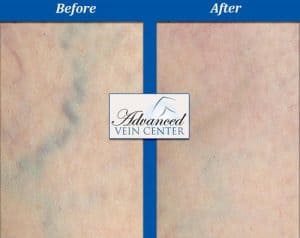Minimally invasive varicose veins
treatment
When conservative varicose veins treatment fail it’s often necessary to physically remove moderate-severe varicose veins. This surgical procedure is known as a microphlebectomy. In this case “micro” means small, “phleb” refers to veins, and “extomy” means to surgically remove. This safe and effective procedure completely resolves varicose veins as they’re physically not there anymore.
This approach is very minimally invasive. Access incisions are typically about 3 millimeters long and usually don’t require stitches. Complications are vanishingly rare, scarring is extremely minimal, and there’s virtually no downtime. General anesthesia isn’t necessary as a local agent such as lidocaine provides complete pain control. Most patients can return to work the same day, and within two weeks can resume strenuous exercise.
More varicose veins treatment
Unfortunately, a microphlebectomy can only target surface veins, not the deeper veins which feed them. Specifically, these underlying diseased veins are almost always the Great Saphenous Vein, the Small Saphenous Vein (SSV), or both. This makes the procedure a cosmetic one aiming to improving the appearance of the legs. Yet only by treating these deeper veins can symptoms be alleviated entirely.
Today a technique known as Radiofrequency (RF) ablation is used to accomplish this goal. It’s an extremely minimally invasive procedure that only takes about 60 minutes and involves little to no downtime. Only local anesthesia is necessary so it’s much safer than earlier procedures, and there’s rarely the need for a hospital stay. Taken as a whole RF ablation is an alternative to vein stripping that’s more effective and much less invasive. Additionally, average RF recovery times are quite short, especially when compared to vein stripping. It’s gives all of the benefits of extensive venous surgery of the legs with almost no downside.
Laser Therapy
A laser is a concentrated beam of light. When a vein is destroyed by heat from laser light during varicose vein treatment, scar tissue is created. Eventually, a “closed” vein stops receiving blood and dies. Compared to vein ligation and stripping, laser therapy is less painful and heals faster. The injured vein may entirely dissolve after a year or two. Laser vein surgery is only effective for treating tiny varicose veins that are close to the surface because it is done externally.
On the other hand, bigger leg varicose veins are best treated using endovenous laser therapy. Through a tiny tube and into the vein, a laser fiber is introduced. When performing this, we look at your vein on a duplex imaging screen.
Can minimally invasive varicose veins treatment be used to treat both cosmetic and symptomatic veins?
Yes, minimally invasive varicose veins treatment can be used to treat both cosmetic and symptomatic veins. These treatments target the underlying cause of varicose veins, which is often venous insufficiency or malfunctioning valves in the veins.
Are there any dietary restrictions I should follow before or after treatment?
Before minimally invasive varicose veins treatment, there are typically no specific dietary restrictions unless advised by your healthcare provider. However, maintaining a healthy diet rich in fruits, vegetables, whole grains, and lean proteins can support overall health and may promote healing.
After treatment, it’s generally recommended to stay hydrated and follow a balanced diet. Some doctors may advise avoiding certain foods or beverages that can increase the risk of blood clots or interfere with healing, such as alcohol and high-sodium foods.
How does minimally invasive varicose veins treatment affect blood flow in the legs?
Minimally invasive varicose veins treatment typically improves blood flow in the legs by addressing underlying venous insufficiency. Here’s how it works:
1. Closure of Problematic Veins: Treatments like endovenous laser ablation (EVLA) or radiofrequency ablation (RFA) target and close off varicose veins that are not functioning properly, allowing blood to flow through healthier veins.
2. Improved Venous Return: By closing off diseased veins, the body reroutes blood flow through healthier veins, improving venous return to the heart.
3. Reduced Pressure: Closing off varicose veins reduces pressure in the veins, which can help alleviate symptoms like pain, swelling, and discomfort.
4. Prevention of Complications: By improving blood flow and reducing pressure in the veins, minimally invasive treatments can help prevent complications such as blood clots and skin ulcers.
5. Promotion of Circulation: Improved blood flow can enhance overall circulation in the legs, reducing the risk of developing new varicose veins and promoting healing.
Call 724-987-3220 Today for an appointment!

